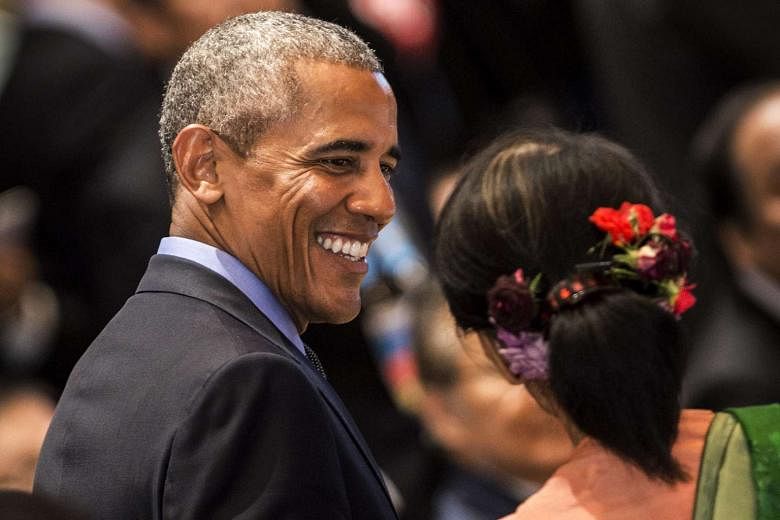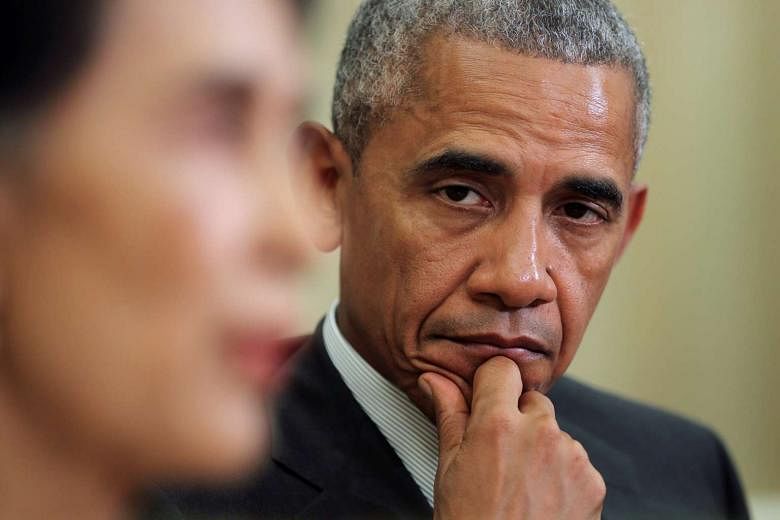WASHINGTON (REUTERS) - Myanmar's Aung San Suu Kyi called on Wednesday (Sept 14) for the lifting of economic sanctions against her country and President Barack Obama, in their first White House meeting since she became her country's leader, said the United States was ready to do so.
"It is the right thing to do in order to ensure that the people of Burma see rewards from a new way of doing business and a new government," Obama said with Suu Kyi sitting next to him in the Oval Office.
The trip by Suu Kyi, who like Obama is a Nobel Peace Prize laureate, capped a decades-long journey from political prisoner to national leader after her party won a sweeping electoral victory last year.
With Suu Kyi no longer an opposition figure, the United States has been weighing a further easing of sanctions against Myanmar, formerly known as Burma, as Obama looks to normalize relations with a country Washington shunned when it was ruled by a military junta.
"We think that the time has now come to remove all the sanctions that hurt us economically," Suu Kyi said, noting that the US Congress had supported her country by backing sanctions in the past to put pressure for democratic reforms.
As Suu Kyi arrived for the meeting, the White House issued a statement saying it would reinstate Myanmar to the Generalised System of Preferences (GSP), which provides duty-free treatment for goods from poor and developing countries.
Myanmar was removed from GSP benefits in 1989 following pro-democracy uprisings a year earlier that were brutally suppressed by the ruling military junta. Myanmar will be back in the program on Nov 13, US officials said.
Reinstating those benefits, combined with the lifting of sanctions, "will give the United States, our businesses, our non-profit institutions greater incentive to invest and participate in what we hope will be an increasingly democratic and prosperous partner for us in the region," Obama said.
The United States eased some sanctions against Myanmar earlier this year to support political reform but maintained most of its economic restrictions with an eye toward penalising those it views as hampering the democratically elected government.
With Suu Kyi in Washington, officials in Myanmar said the government there was making a push to overhaul rules on new foreign investment this week.
New investment approvals have fallen since Suu Kyi took power in April and some businesses and investors have criticised her for failing to prioritize the economy.
'INCREMENTAL PROGRESS'
A group of 46 non-governmental organisations circulated a letter they wrote to Obama on Monday expressing concern about easing sanctions on Myanmar while human rights abuses by the military and against Rohingya Muslims persisted.
"To lift sanctions prior to tangible change for suffering communities would be a disservice to those vulnerable peoples who deserve international protection," it said.
Suu Kyi has been criticised by some rights groups for not doing enough to address the plight of the Rohingya. Some 125,000 Rohingya remain in temporary camps in the country's Western Rakhine State following violence in 2012.
Under the country's citizenship law, the Rohingya are not recognised as one of the country's 135 official ethnic groups and are stateless. They are seen as illegal immigrants from neighbouring Bangladesh and deeply disliked by many in Myanmar, particularly Rakhine Buddhists.
"We want to make sure that everybody who is entitled to citizenship is accorded citizenship as quickly and as fairly as possible. This is what we are trying to do in Rakhine," Suu Kyi said.
On Wednesday, US Senator Bob Corker, the chairman of the influential Senate Foreign Relations Committee, criticised what he described as Suu Kyi's "dismissive" reaction to concerns he had raised about her country's record on human trafficking.
"After witnessing her lack of regard for Burma's dismal track record on this issue, I plan to pay very close attention to her government's efforts to prevent innocent human beings from being trafficked and sold into forced labour and sex slavery," Corker said in a statement released to Reuters after a breakfast meeting with Suu Kyi and Vice-President Joe Biden.








